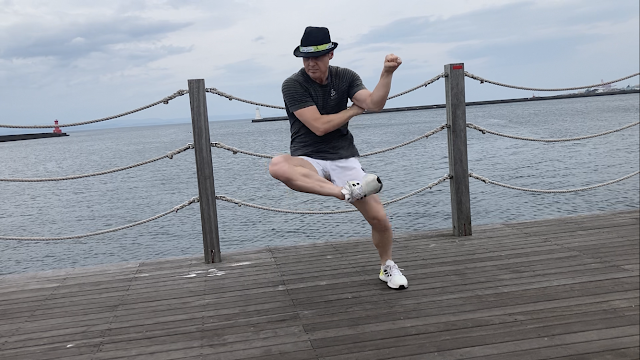 |
| Kanku Dai Kata |
 |
| Practicing Tekki Shodan at Oita Wharf. |
Some people insist that 型
(KATA) are unnecessary and/or outdated; however, to my seniors here in Japan,
my Budo karate colleagues, students and myself, “….without kata there is no
karate”.
Likewise, if someone only practices kumite they are not
karateka.
Karate styles literally are determined by the kihon, applications
and tactics within the kata they have. This is one of the reasons even if
someone practices the kata from another style, more experienced karateka will
still be able to ascertain the individual's style: irrespective of how precisely
they copy the waza of another Ryuha.
Osaka Yoshiharu Sensei once said to me and my wife at dinner
“you can see the style the person began karate in, within their kata”;
furthermore, in these regards, he went on to stress “…the style one begins in
is therefore very important”.
Another Sensei, not to me directly but to a class, has some
very interesting comments about styles and kata. Isaka Akihito Sensei stated
that “the mixing of styles is highly problematic, as it nullifies the special
points of each of them”.
In light of these points, it is easy to see that kata and
karate, and kata and ryuha are inseparable. Without kata one simply has a form
of boxing/kickboxing which quickly results in the technical characteristics of
karate and the various ryuha to diminish.
I will not lie here and say that ‘one NEEDS kata for
self-defense’. Of course, that’s not true. But certainly kata, when trained
correctly, contributes to one’s capacity in these regards; furthermore, finely
allows one to practice in isolation when a training partner is not available.
Of particular importance is the motivational aspect of kata training, which is
one of the great points of karate.
It has been well detailed that Funakoshi Gichin Sensei
almost exclusively trained in kata, and that he was against competition kumite.
But we have to remember how he learned karate.
The focus was life and death in self-defense; moreover, that karate must
only be used when absolutely necessary.
With this in mind, and “…the movements of kata applied in
very dangerous ways” we can realize why Master Funakoshi was against humans
applying these waza; likewise, that he couldn’t accept karate being executed in
more ‘fist kendo’ manner, with specific weapons of the body attacking
vulnerable points of the human body.
So again, to him, kata practice was utterly imperative for
karateka. In sum, “…the origin of kihon
and containing the applications (and tactics) refined and handed down from past
experts”.
While I won’t delve too much into this here, this is the
value of the additional kata Asai Tetsuhiko Sensei handed down to us. This
extension of Shotokan for senior practitioners has “…immense value for our style via ‘the filling of technical
gaps’, without compromising our ryuha”.
I need to add here one more important point. Kata functions as a TEACHER! Yes, our SENSEI!!! By the serious and on-going practice of Kata and Oyo, one strips back the layers of skills, applications and tactics. In addition to this, as one age's, experiences injuries, illness, and so on, kata changes for us: even helping us to change! A concrete example for me is since Asai Sensei passed away I'm still unpacking secrets from the numerous kata that he personally taught me. So, kata is like a treasure chest which contains numerous gems. Hence, without kata, I'd never have found these, let alone ever being aware of them.
To conclude, I personally do not believe in only the function of karate for self-defense, even though this underpinned its historical evolution and development. Yes, rudimentary self-defense is a prime physical/technical aim; but also karate for holistic health and fitness; as an art; and so forth. Ironically, though, when the physical focus leaves from self-defense, kata (and karate in general) also loses its beauty, which is only expressed by its effectiveness.
 |
| Funakoshi Gigo Sensei: Movement 17 of JITTE KATA. Migi ashi mae fudo-dachi! |

No comments:
Post a Comment